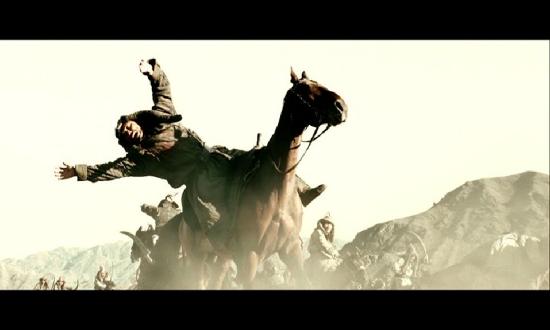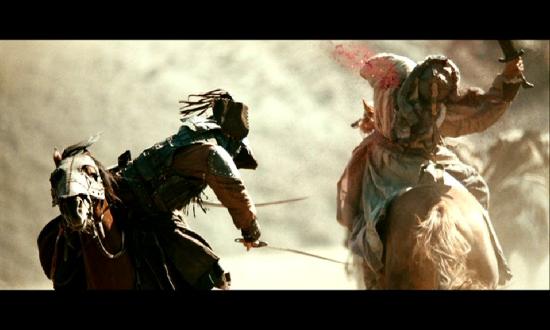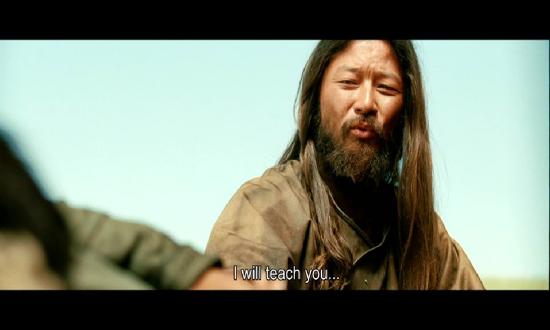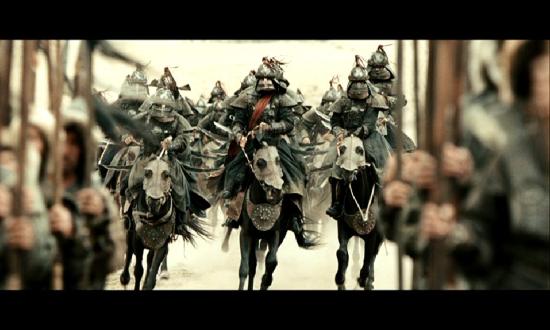Mongol
Introduction
Genghis Khan, like other historical conquerors, such as Attila the Hun and Alexander the Great are famous, but not widely taught in schools. Loathed and loved, Genghis Khan was born Temudgin in 1162 and founded the Mongol Empire, the largest empire the World has even seen.
Directed by the award-winning Russian filmmaker, Sergei Bodrov and using a crew of hundreds from Russia and China, Mongol is the first part in a trilogy about the life of Genghis Khan.
Nine year old Temudgin is taken by his father to pick a bride from a tribe, to make amends for stealing his wife from them, but Temudgin has other ideas and agrees to marry Borte from a different tribe. On the way back, his father is poisoned by a rival tribe and, in a power struggle at home, Temudgin is taken prisoner by Targutai, who has assumed his father's Khan status, until he is tall enough to be killed. Escaping and seeking assistance from Tengri, God of the Blue Sky, he is saved by Jamukha and the two become blood brothers.
Mongol follows Temudgin's life from childhood to Genghis Khan, husband, father, military commander and leader of the united Mongol people.
Video
Filmed on the Mongolian steppes, Mongol is visually spectacular and the battle scenes are incredibly well choreographed, brutal and stunning to watch. Sergei Bodrov has a keen visual sense and is equally adept at filming huge vistas as he is with intimate scenes in tents.
This looks brilliant, for a DVD, but it pales in comparison to the Full HD picture on the Blu-ray Disc.
Audio
Given the choice of stereo or a Dolby Digital 5.1 soundtrack, both in Mongolian, I chose the latter and wasn't disappointed by crystal clear sound, delicate in parts, bombastic in others though the DTS HD Master on the Blu-ray sounds far better.
The subtitles are a little odd, burnt in to the picture, with some in a black box and others not, seemingly at random but you soon get used to it and it's not an issue.
Extra Features
There is only a 26-minute Making of which is a Russian production with English subtitles, comprised of b-roll footage and interviews with members of the cast and crew. I don't know why, considering that to most in the West, he is simply a name, there wasn't any historical information about the real Genghis Khan by scholars or a more comprehensive 'behind the scenes' package.
Conclusion
As I said, Genghis Khan is a polarising figure, adored in China, Mongolia and Japan (each claiming 'ownership' of him) but apparently widely hated in Russia so it's slightly odd that this should be a German/Russian production, directed by a Russian and with Japanese star Tadanobu Asano in the lead.
Given his bloodthirsty reputation, it's only fitting that a biopic of the Asian conqueror should be violent and there are battle scenes of extraordinary brutality and bloodshed. The rest of the film is more concerned with Temudgin as a young boy, his reliance on his wife for advice and assistance and his acceptance of children who may or may not biologically be his.
The narrative frame is odd, beginning about two thirds of the way through the film as Temudgin sits in a cell where he told that the monk he sent to find his wife is dead before flashing back to his childhood and progressing from there to his imprisonment and beyond.
Watching this, I was reminded of other contemporary historic epics such as Troy (2004), Kingdom of Heaven (2005) and Alexander (2004) and looking at the figures on the IMDb, it's astonishing the disparity in budgets between Mongol and the western films - Sergei Bodrov had a budget of $20 million whereas the cheapest of the others was $130 million, with Troy costing a whopping $175 million! It goes to show that the size of the budget isn't as important as how it's used, though filming in Mongolia with a Russian and Chinese crew and with a principal cast containing non-actors will have helped - the likes of Brad Pitt don't come cheap!
Mongol is an extremely impressive film, beautifully shot and brilliantly acted - it can't be easy to humanise a man regarded as a barbaric monster but it's something that Bodrov does with ease, even working with cast and crew from all over Asia.
If the trilogy continues and is successful, I wouldn't bet against a multi-disc release of the three films with a plethora of extras but, until then, this is well worth your time and money but, if you have the equipment, get the Blu-ray.




Your Opinions and Comments
Be the first to post a comment!